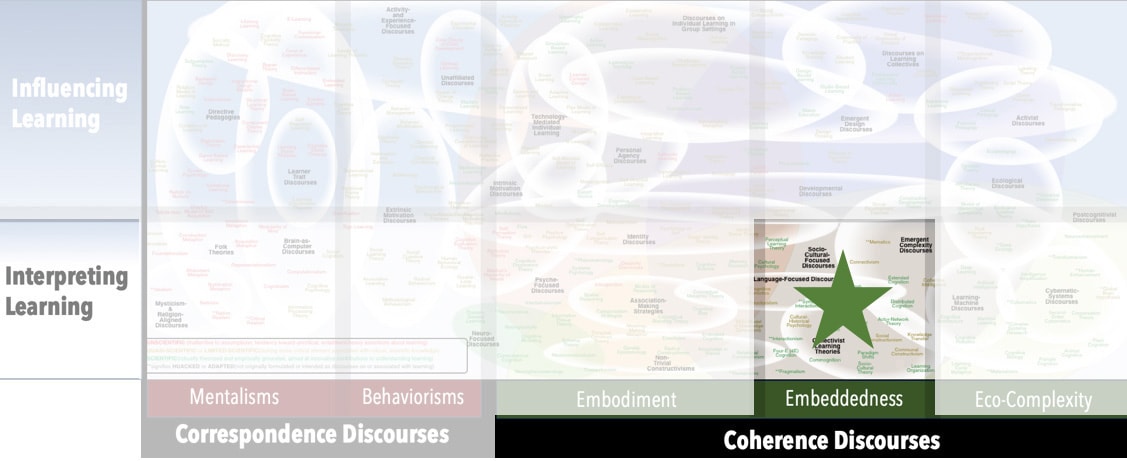Focus
Emergence and maintenance of systems of meaning/significationPrincipal Metaphors
- Knowledge is … all systems of meaning/signification
- Knowing … one’s system of meaning/signification
- Learner is … an evolving system of meaning/signification
- Learning is … participating in and evolving (systems of meaning/signification)
- Teaching is … enculturating (into systems of meaning/signification)
Originated
1960sSynopsis
Post-Structuralism, as its name suggests, is a response to earlier theories. Asserting that neither underlying structures (i.e., Structuralism) nor subjective experience (i.e., Phenomenology) are adequate to understand the meaning and significance of an object, Post-Structuralism argues that such understanding entails interrogation/deconstruction of both what is present (i.e., the meaningful/significant object) and what is absent (i.e., the mostly implicit systems of knowledge that define the object and render it meaningful/significant). Subdiscourses, associated discourses, and key constructs of Post-Structuralism include:- Arborescent (Gilles Deleuze, Félix Guattari , 1980s) – essentially, Dichotomous Thinking (under Modes of Reasoning) – that is, framing a thought or argument in terms of non-overlapping branches, dyads, and/or polar opposites. The word Aborescent is based on the image of a genealogical tree, which was chosen for its intimation of a unidirectional series of binary cuts. (Contrasts: Rhizome, below; Bifurcation, Genealogy, both under Modes of Reasoning) Models of Arborescent thinking include:
- Figurative System of Human Knowledge (Tree of Diderot and d’Alembert) (Denis Diderot, Jean le Rond d’Alembert, mid-1700s) – a taxonomy of knowledge, organized as a tree with three principal branches: Mémoire (Memory/History), Raison (Reason/Philosophy), Imagination (Creativity/Poetry)
- Deconstruction (Jacques Derrida, 1980s) is a notion that, by the design of its original author, can be construed either as having multiple definitions or as defying definition. Most often presented as a counter-discourse to Naïve Realism (under Realism) and Naïve Idealism (under Idealism), Deconstruction typically directs attention to the role of language in formatting (experiences of) reality as it leans into the arts to interrupt and offer alternatives to popular perceptions of the real.
- Deferral – an acknowledgement that, for a particular detail is made the focus of attention, one must ignore (“defer”) not just a sea of other possible foci, but the many layers of intersecting discourses that render that focus a matter of interest. The idea of Deferral is prominent in both Post-Structuralism and Postmodern Epistemologies (see Epistemology) as they challenge the modernist quest for totalized understandings. These discourses assert that complete knowledge is unattainable, as all claims to truth are partial (both in the sense of “partial = incomplete” and the sense of “partial = biased”).
- Différance (Jacques Derrida, 1980s) – a portmanteau, intended to combine the suggestion from Structuralism that meaning arises within systems of “difference” with the notion of Deferral (see above)
- Hyperreality (Jean Baudrillard, 1980s) – perceptions of “reality” that arise through the conflation (and consequent confusion) of fact and fiction – via, for example, manipulation of representations, distortions of truth, and/or restricted access to knowledge
- Reconstructivism (Frankfurt School, 1930s; Jacques Derrida, 1980s) asserts that societal evolution should not be left to chance; rather, ongoing reform should be geared toward greater citizen awareness and more ethical institutions. Recent versions often draw heavily on methods associated Deconstruction.
- Rhizome (Gilles Deleuze, Félix Guattari, 1980s) – a type of sociocultural network, the nodes and links of which define the flow of meaning and power. The notion is based on the subterranean root systems of some spreading plants. While the concept predates Network Theory by nearly two decades, a Rhizome was described in very much reflective of the more recent construct of Decentralized Network (see Complex Systems Research). (Contrast: Arborescent, above.)
Commentary
Certainly, the most common criticism of Post-Structuralism from outside the theory is that its authors can be nearly incomprehensible – to the point that some critics have successful duped “experts” by publishing gibberish in prominent refereed journals associated with the theory. Concerns expressed from inside the theory tend to cluster around the difficulty (or, arguably, impossibility) of using language to push language aside.Authors and/or Prominent Influences
Jacques Derrida; Michel FoucaultStatus as a Theory of Learning
Post-Structuralism is not normally identified as a theory of learning. However, like Structuralism, it might be characterized as a trans-level theory of learning – that is, one that offers a theory of meaning that applies at both individual and cultural levels.Status as a Theory of Teaching
Post-Structuralism is sometimes embraced as a theory of social action that entails conscious and intentional action in relation to teaching and other acts associated with enculturation. However, Post-Structuralism is not a theory of teaching, insofar as teaching is understood a deliberate act. Notably, it is a major discourse informing Critical Pedagogy.Status as a Scientific Theory
Post-Structuralism cannot be said to have a broad or substantial empirical base – but it does offer a rather cutting and robust argument to explain why empirical standards should not be assumed or imposed in this case.Subdiscourses:
- Arborescent
- Deconstruction
- Deferral
- Différance
- Figurative System of Human Knowledge (Tree of Diderot and d’Alembert)
- Hyperreality
- Reconstructivism
- Rhizome
Map Location

Please cite this article as:
Davis, B., & Francis, K. (2024). “Post-Structuralism” in Discourses on Learning in Education. https://learningdiscourses.com.
⇦ Back to Map
⇦ Back to List
